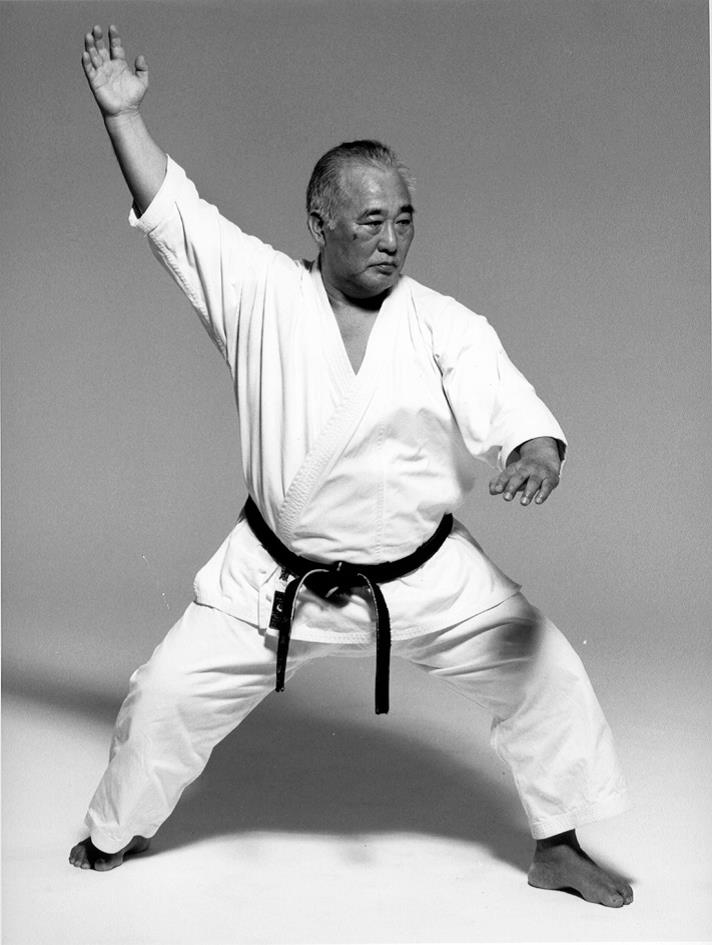Taiji Kase: Pioneering Shotokan Karate in Europe

Taiji Kase (1929-2004)
Taiji Kase, born on February 9, 1929, in Chiba, Japan, left an indelible mark on martial arts, particularly Shotokan Karate. A distinguished Korean-Japanese master, Kase was not only one of the earliest figures responsible for introducing Shotokan Karate into Europe but also a highly respected instructor, author, and proponent of martial arts. This article chronicles the life and contributions of Taiji Kase, highlighting his journey from a young martial arts enthusiast in Japan to a global ambassador for karate.
Early Life and Martial Arts Beginnings
Taiji Kase was born into a family with a solid martial arts background. His father, Nobuaki Kase, held the prestigious rank of 5th dan in judo. In this environment, young Taiji Kase began his martial arts journey.
Before his sixth birthday, Kase started learning judo, setting the foundation for his future endeavours. As he grew older, he expanded his martial arts repertoire to include aikido and kendo, showcasing his early dedication and passion for combat disciplines.
In 1944, at 15, Kase achieved the impressive 2nd dan black belt rank in judo. During this period, he discovered karate through a book authored by the renowned Gichin Funakoshi. Inspired by Funakoshi's teachings, Kase embarked on a journey to study karate under the master himself. He also had the privilege of training under GigÅ Funakoshi, Gichin Funakoshi's son, until the latter's passing in 1945. Genshin Hironishi took over as one of Kase's primary instructors, along with Tadao Okuyama, significantly influencing his development in karate. Despite being due for a 3rd dan in judo, Kase focused solely on karate.
Karate Career and Dedication
In March 1945, during the closing stages of World War II, Kase enlisted in the Imperial Japanese Navy and joined the Kamikaze Corps. Fortunately, the war ended before he was required to sacrifice his life for his country. Kase's resilience and positive outlook on life were evident in his philosophy, often expressed through his characteristic smile.
After the war, Kase encountered a challenge as the Shotokan dojo had been destroyed by bombing. Unable to find another suitable karate dojo, he briefly returned to training in judo. However, when the Shotokan students reassembled under Funakoshi's guidance, Kase eagerly rejoined them.
In 1946, Taiji Kase earned his 1st dan in Shotokan karate. He continued his education by studying economics at Senshu University, where he excelled as captain of the university's karate team in 1949. During the same year, he attained the prestigious rank of 3rd dan.
Kase's dedication to karate led him to join the newly formed Japan Karate Association (JKA) with aspirations of becoming a professional karate instructor. His expertise extended to training instructors in kumite (sparring), and among his students were notable figures such as Keinosuke Enoeda, Hiroshi Shirai, and Hideo Ochi. Following the JKA division following Funakoshi's death in 1957, Kase maintained connections with both factions.
Global Ambassador for Karate
In 1964, Taiji Kase embarked on a journey to introduce karate to the world. He spent three months teaching in South Africa, continuing his mission the following year alongside Enoeda, Shirai, and Hirokazu Kanazawa. Kase's global karate odyssey extended to the United States of America, West Germany, the Netherlands, and Belgium from 1965 to 1966.
1967, Kase arrived in France, making Paris his home for almost 20 years. He served as the coach of the French Karate Federation in 1968. His influence on European karate was profound, with many of his European students, including Steve Cattle, making significant contributions to the discipline. Kase authored several books on karate during his time in France, sharing his knowledge and expertise.
Later Life and Legacy
In 1989, Taiji Kase, alongside Hiroshi Shirai, founded the World Karate-Do Shotokan Academy (WKSA). Kase's unique style of karate became known as "Shotokan Ryu Kase Ha," signifying Shotokan with his personal touch. Despite his global travels to promote his style of karate, Paris remained his home base.
In 1999, Kase faced a significant health challenge when he suffered a heart attack. Remarkably, he recovered and resumed his role as a karate instructor, demonstrating his resilience and unwavering dedication.
Unfortunately, in November 2004, Kase's health took a turn for the worse. He passed away on November 24, 2004, leaving a profound legacy in the karate world. His contributions to karate's global spread, his commitment to teaching, and his positive outlook on life inspire martial artists worldwide.
Kase's legacy lives on through his students and the organisations he founded. His widow, Chieko Kase, became the honorary President of the Kase Ha Shotokan Ryu Karate-Do Instructors' Academy, ensuring that his teachings endure for future karate enthusiasts.
In conclusion, Taiji Kase's life journey exemplified dedication, passion, and a relentless pursuit of excellence in martial arts. His pioneering efforts in introducing Shotokan Karate to Europe and his contributions as an instructor and author have left an enduring mark on the global karate community.
Book a Free Trial Class at Bushido Karate Club
Bushido Karate Club is currently accepting new members. Contact us today to book a trial class in Douglas or Carrigtwohill and begin your karate journey. Places are limited so call today to avoid disappointment.
Tel: +353876307006






